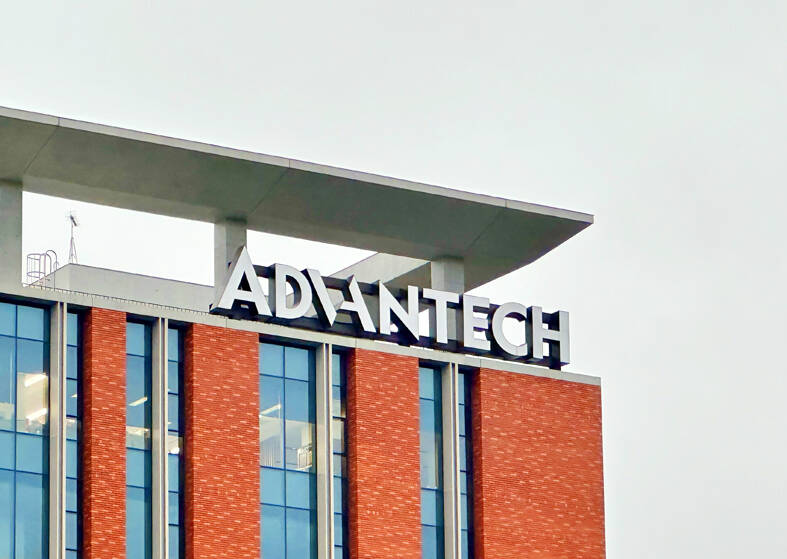Advantech Co (研華) expects revenue momentum to gradually strengthen in the second half of this year after its sales and earnings grew last quarter compared with the previous quarter, the nation’s largest industrial PC maker said yesterday, citing customers’ growing interest in its applications amid global industrial automation and the smart energy trend.
The company also expects great business opportunities ahead driven by advancements in artificial intelligence (AI) technology, as it has teamed up with silicon vendors and AI software partners to develop an Edge AI ecosystem, Advantech said in a statement released after a board meeting.
“This initiative aims to offer a broader range of hardware, software and services choices, aspiring to become the preferred ally for enterprise customers in Edge AI applications,” the statement said.

Photo: Fang Wei-chieh, Taipei Times
The company’s book-to-bill ratio climbed to 1.01 last quarter from 0.97 in the first quarter, exceeding the 1.00 mark for the first time since the second quarter of 2022, as the recovering global economy helped improve its order intake and drove sales growth, it said.
A regional breakdown of the book-to-bill ratio revealed the company’s optimism regarding steady recovery in global macroeconomics and corporate spending, as the ratio last quarter was 1.00 for North America, 1.04 for Europe and 1.02 for China, it added.
Advantech, the first regional industrial PC vendor dedicated to smart cities and the Internet of Things, reported a net profit of NT$2.11 billion (US$64.3 million) in the second quarter, up 6 percent from the previous quarter, but down 30 percent from a year earlier.
Earnings per share were NT$2.46 last quarter, compared with NT$2.32 in the first quarter and NT$3.51 a year earlier.
Second-quarter revenue was NT$14.64 billion, up 6 percent quarter-on-quarter, but down 14 percent year-on-year, the company said.
Gross and operating margins improved last quarter to 40.2 percent and 14.3 percent respectively from the previous quarter, it added.
Advantech’s cumulative net profit in the first half of this year decreased 31 percent year-on-year to NT$4.11 billion, or earnings per share of NT$4.78, while total revenue fell 17 percent to NT$28.52 billion from a year earlier.
“The revenue and profits in the first half declined by double-digit percentages mainly due to the systematic impacts of geopolitical issues and high inflation, resulting in slowing demand in global end-markets. However, as the global economy slowly recovered, overall order demand has rebounded,” Advantech chief financial officer and president of general management Eric Chen (陳清熙) said in the statement.
By region, sales in Taiwan during the first half outperformed other markets with a 12 percent annual increase, mainly driven by shipments of products linked to semiconductor equipment and gaming projects, Advantech said.
Sales to North America, Europe, North Asia and emerging markets all posted double-digit percentage declines, while shipments to China registered a single-digit percentage fall on an annual basis, the company said.

TAKING STOCK: A Taiwanese cookware firm in Vietnam urged customers to assess inventory or place orders early so shipments can reach the US while tariffs are paused Taiwanese businesses in Vietnam are exploring alternatives after the White House imposed a 46 percent import duty on Vietnamese goods, following US President Donald Trump’s announcement of “reciprocal” tariffs on the US’ trading partners. Lo Shih-liang (羅世良), chairman of Brico Industry Co (裕茂工業), a Taiwanese company that manufactures cast iron cookware and stove components in Vietnam, said that more than 40 percent of his business was tied to the US market, describing the constant US policy shifts as an emotional roller coaster. “I work during the day and stay up all night watching the news. I’ve been following US news until 3am

UNCERTAINTY: Innolux activated a stringent supply chain management mechanism, as it did during the COVID-19 pandemic, to ensure optimal inventory levels for customers Flat-panel display makers AUO Corp (友達) and Innolux Corp (群創) yesterday said that about 12 to 20 percent of their display business is at risk of potential US tariffs and that they would relocate production or shipment destinations to mitigate the levies’ effects. US tariffs would have a direct impact of US$200 million on AUO’s revenue, company chairman Paul Peng (彭雙浪) told reporters on the sidelines of the Touch Taiwan trade show in Taipei yesterday. That would make up about 12 percent of the company’s overall revenue. To cope with the tariff uncertainty, AUO plans to allocate its production to manufacturing facilities in

Six years ago, LVMH’s billionaire CEO Bernard Arnault and US President Donald Trump cut the blue ribbon on a factory in rural Texas that would make designer handbags for Louis Vuitton, one of the world’s best-known luxury brands. However, since the high-profile opening, the factory has faced a host of problems limiting production, 11 former Louis Vuitton employees said. The site has consistently ranked among the worst-performing for Louis Vuitton globally, “significantly” underperforming other facilities, said three former Louis Vuitton workers and a senior industry source, who cited internal rankings shared with staff. The plant’s problems — which have not

COLLABORATION: Given Taiwan’s key position in global supply chains, the US firm is discussing strategies with local partners and clients to deal with global uncertainties Advanced Micro Devices Inc (AMD) yesterday said it is meeting with local ecosystem partners, including Taiwan Semiconductor Manufacturing Co (TSMC, 台積電), to discuss strategies, including long-term manufacturing, to navigate uncertainties such as US tariffs, as Taiwan occupies an important position in global supply chains. AMD chief executive officer Lisa Su (蘇姿丰) told reporters that Taiwan is an important part of the chip designer’s ecosystem and she is discussing with partners and customers in Taiwan to forge strong collaborations on different areas during this critical period. AMD has just become the first artificial-intelligence (AI) server chip customer of TSMC to utilize its advanced